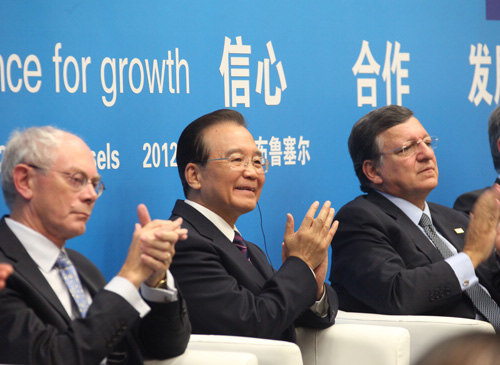|
 |
|
HIGH-LEVEL EXCHANGE: President of the European Council Herman Van Rompuy, Chinese Premier Wen Jiabao and President of the European Commission Jose Manuel Barroso (left to right) attend the China-EU Business Summit, a business event held alongside the China-EU Summit, in Brussels on September 20 (ZHANG WEIRAN) |
The 15th China-EU Summit in Brussels came at a crucial time in mid-September, as both sides endeavor to cope with the currently gloomy global economic situation.
Observers stressed the importance of cooperation in settling disputes between the two sides, noting their "comprehensive strategic partnership" based on mutual respect and tremendous economic interdependence.
China and the EU established a comprehensive strategic relationship in 2003, resting fundamentally on the trade and economic connection between them. Both sides are experiencing difficulties due to the spreading debt crisis in Europe and the global economic slowdown. At such a sensitive moment, stabilizing relations through high-level communication is of heightened importance.
China and the EU are partners rather than competitors, said Cai Fangbo, a research fellow with the China Institute of International Studies, adding great progress has been made in their relationship since 2003. They have established more than 60 dialogue mechanisms for political, economic, cultural, scientific and energy aspects as well as frequent high-level exchanges. During Premier Wen Jiabao's visit to Europe, the two sides released a joint statement and many cooperative documents concerning science and technology, monopoly prevention, low-carbon and sustainable development. The joint statement included dozens of agreements covering five key points: comprehensive strategic partnership; trade, economy and investment; bilateral cooperation; peace and security; and global issues.
"Trade and economic relations comprise the most important part of the China-EU relationship. Premier Wen's recent visit was very helpful for coordinating their stances and stabilizing China-EU relations. A weakened trade and economic relationship will hurt both sides," said Liu Mingli, a researcher of European studies with the China Institutes of Contemporary International Relations, in an interview with Beijing Review. Statistics show that the EU has now become China's top trading partner and largest export market, with last year seeing two-way trade between China and the EU quadruple from that of 10 years ago, to $567.2 billion. The bilateral trade volume from January to July this year reached $315.75 billion. "Trade and economic cooperation deepens the interdependence between China and the EU," said Liu.
The visit was conducted at a key moment, with observers noting a distinct difference in tone from previous summits. Europe's debt crisis is escalating. It has affected the third and fourth biggest economies inside the euro zone, Spain and Italy. Compared with the smaller economies of Portugal and Greece, Spain and Italy are more influential in the euro zone and represent even bigger challenges, said Liu. According to Liu, the euro zone's 2012 GDP might decrease 0.4 percent, greatly constraining the domestic demand of EU members.
China is also suffering from the European debt crisis. EU states prefer fiscal austerity to deal with the crisis, and some are moving to trade protectionism. "China's exports to the whole of Europe have consequently slid sharply," said Liu. "Premier Wen's visit enabled the two sides to coordinate their stance at the governmental level."
The lingering debt problem poses a big threat to the economic recovery of Europe and even jeopardizes the momentum for global economic growth. The Chinese premier once again promised to offer a helping hand in dealing with the EU's financial crisis. As always, China will support the efforts made by Europe to solve the debt problems and will strengthen communication and cooperation with EU bodies, the European Central Bank, and the International Monetary Fund (IMF), Wen said during the visit. China will continue to play a positive role in helping soothe Europe's debt concerns by expanding its contribution to the IMF, purchasing European bonds, and increasing its investment in the region, Wen said. He added that China welcomes European enterprises to use the Chinese yuan in cross-border trade and investment and is willing to work with Europe to establish bank branches on both sides.
"Frankly speaking, the financial situation is not optimistic," said Liu. "It is further complicated by the lack of a unified stance on the problem by EU members." Furthermore, there are differing views on accepting Chinese assistance. Countries in Southern Europe like Greece, Portugal and Spain would like to accept more help from China for relief and to buy time for implementing economic and financial reforms. However, countries like Germany, Finland and the Netherlands believe China's involvement could slow down South European nations' pace of reform. "These countries think now is the time to force debt-ridden governments to implement painful but profound reforms, in order to solve the problem once and for all," Liu said. However, Germany's attitude has changed somewhat due to the severity of the crisis, he added.
|
